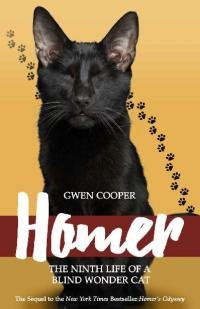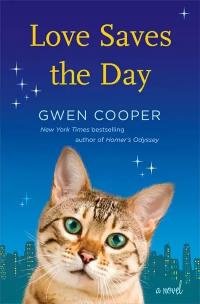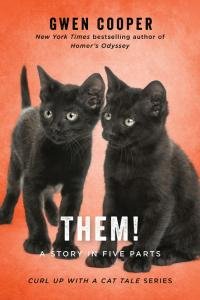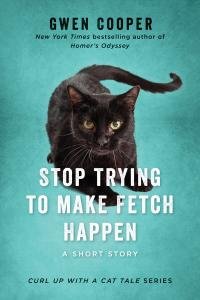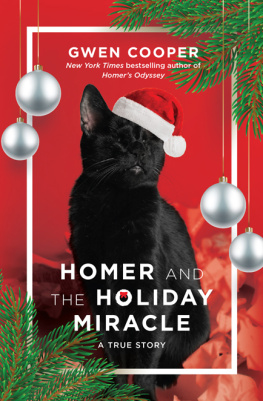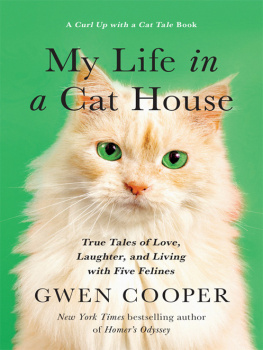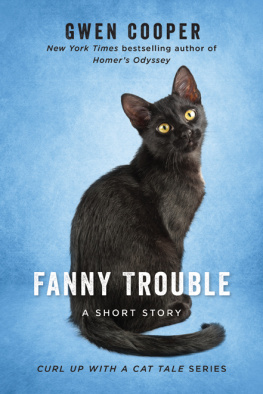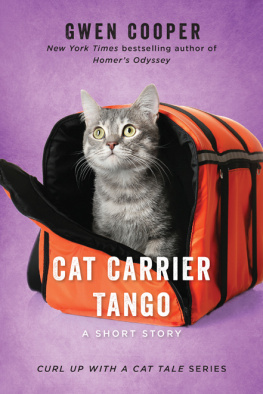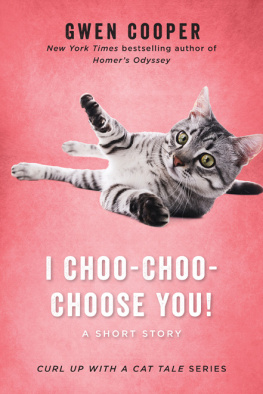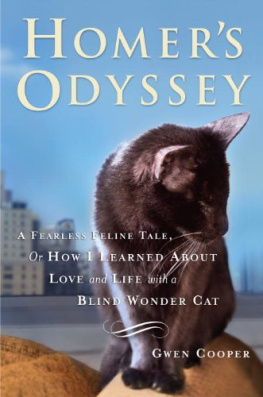I Choo-Choo-Choose You!
Gwen Cooper
BenBella Books, Inc.
Dallas, TX
Copyright 2018 by Gwen Cooper
All rights reserved. No part of this book may be used or reproduced in any manner whatsoever without written permission except in the case of brief quotations embodied in critical articles or reviews.
BenBella Books, Inc.
10440 N. Central Expressway, Suite 800
Dallas, TX 75231
www.benbellabooks.com
Send feedback to feedback@benbellabooks.com
e-ISBN: 978-1-946885-83-8
Distributed to the trade by Two Rivers Distribution, an Ingram brand www.tworiversdistribution.com
I Choo-Choo-Choose You!
Pandora (Pandy for short) was a purebred Siamese and could only be describedalthough this phrase wasnt in common use twenty years agoas a hot mess.
Some of her problems were obvious even to a casual observer. For one thing, Pandy was morbidly obese. She had all of a Siamese cats fine-boned delicacy of frame from the shoulders up and the hips down. But her midsection carried an excess seventeen pounds of pure lard. The tiny, porcelain-doll perfection of her head and neck made for a jarring contrast with the enormous bellyballooning out on each side of her bodythat swayed ponderously as she walked. Watching Pandy stroll about the house always made me think of a song popular on Miami dance radio at the time, which admonished, Shake it . . . dont break it . . .
I loved Pandy dearly, but I was probably the only one who did, aside from Maggie, my boyfriend Jorges mother. She didnt do a very good job of keeping her hindquarters clean, bless her heart. (Pandy, that isnot Jorges mother.) Whether this was because her girth hampered her ability to reach around and get in there, or because Pandy had given up in some fundamental way, was unclear. But every upward flick of her tail revealed an incriminating brown ring, as permanently fixed as if it were tattooed to her fur, no matter how often or assiduously Maggie tackled Pandy with the Baby Wipes.
Pandy would unerringly zero in on the visitors and houseguests who were the least interested in cats, and whenafter shed repeatedly pawed at their legs for attentionthe hapless visitors would finally relent and try to pet her, she would lash out violently, leaving confusion, claw marks, and little tufts of yellow Siamese fur in her wake as she fled for refuge under Jorges parents bed. And woe betide the unsuspecting cat lover who attempted a friendly scritch behind Pandys ears and ended up pulling back a bloodied hand for their trouble.
At seven years old, Pandy still suckled daily at the long-dry teats of her mother, Persephone (aka Persy), from whom shed never been separated a day in her life. This, according to Maggie, was the true source of what was alternately referred to as Pandys quirks, Pandys problems, or, perhaps most accurately, Pandys neuroses.
Cats arent supposed to live with their mothers their whole lives, Maggie would say. And then shed add, Nobody is, really.
In human years, Pandy would have been somewhere in her mid-forties. I thought about Grey Gardens and The Glass Menagerie, and the entire literary pantheon of bitter or dotty middle-aged spinsters whod never left their parents homesand then I tried to imagine what I might be like if I were still living with my own mother when I was in my forties.
Definitely not, Id agree, with a shudder.
I was twenty-three and had just moved in with Jorge, my first serious relationship post-college. We were living in a small one-bedroom apartment in a two-story low-rise owned by one of Jorges uncles, nestled deep in the warren-like side streets of Miamis Little Havana. The people living all around us had emigrated from the mountains of Cuba, and they kept chickens in the postage-stamp backyards of their tiny, ranch-style homes. It was an odd (and often irritating) thing to be living in Miami in the 1990samong bustling traffic and construction and silvery skyscrapers gleaming on the horizonyet wake up at five thirty every morning to the sound of roosters crowing twenty yards away.
My own family were also animal people. My father liked to spend time at the stables where Miamis mounted police kept their horses, and the puppies we adopted came from these animal-loving officers, inevitably with some heart-rending back story: Misty, a petite German shepherd/whippet cross, had been thrown from a moving car on I-95; Casey, a yellow pit bull/Lab mutt, had been used as bait in a dog-fighting ring. And so on.
We made much of these dogs, conspicuous even in a neighborhood of pampered, pedigreed pooches as a family who spoiled their dogs rotten. Often we came home to find that one or another of our neighbors dogs had escaped from his own yard and was camped out on our front porch. We would joke that the neighborhood dogs must have some kind of communications network, a way of telling each other that while they all might be treated well, at the Coopers a dog lived like a king! We laughed about it, but I do think we were always tryingwith years of love and slavish attentionto make up for those early traumas our dogs had suffered.
Id always imagined that I would get a dog of my own when I finally moved into my first grown-up apartment. But the place Jorge and I shared was very small, without so much as a proper patch of grass for a dog to run and play onand, as young adults striving to build our careers, the hours Jorge and I worked were long. I was running a youth outreach program that promoted community volunteering among middle- and high-school students. Jorge was a production assistant on commercial video shoots. When we werent working, we were often at after-hours networking functions, trying to make the connections that would give us the next leg up. Nothing in our lifestyles seemed conducive to canine guardianship.
Still, as far as I was concerned, a home wasnt a home at all if there werent any animals living in it.
The highlight of my week was always Sunday, when wed go out to brunch with Jorges parents and then back to their house to while away the afternoon until Sunday dinner. It was a joy to spend time with Pandy and Persy and Olympiaa slender, auburn-hued Abyssinianalong with the family dog, a coal-black pit bull named Targa. Targa was more utterly gaga over humans than any dog Ive known before or since. In fact, Jorges parents house had been robbed three times (such was Miami in the 80s and early 90s) while Targa was in itand, according to the one intruder the police had eventually caught, Targa had done little to foil the burglars beyond licking them ecstatically and bringing over her toys.
Targa may have loved people, but she hated all three cats with a deep and murderous hatred. I never witnessed any of it firsthand, but I heard stories of close calls and surprise attacks that very nearly ended in bloodshed. Jorges parents never left Targa and the cats together unsupervised when they were out, and even when they were home they always kept Targas muzzle close at hand.
The feeling was more than mutual. The cats delighted in finding little ways to goad Targa when they thought no one was looking. Pandy, in particular, would take malicious glee in peeing on Targas dog bed the moment Targa left it unattended to play in the backyard.
As I said, many of Pandys problems in life were apparent at a first glance. That Pandy was a menace to new people, howeveror even to people she already knew; Jorge, his father, and his sisters bore their share of Pandy-inflicted war woundswas something I didnt know initially. I didnt find out for months, until Maggie confided it to me one afternoon in a kind of shocked undertone, upon finding a blissed-out Pandy, purring and unconscious, draped across my legs. By that point, Pandy and I were already deep into the early stages of our four-year love affair.
Next page

